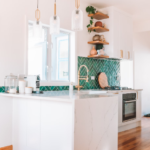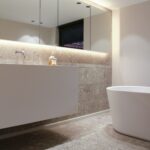As stone restoration specialists, we’ve witnessed countless bathroom renovations over the past two decades. What we’ve learned is that selecting the right material for stone tile bathroom floors is one of the most crucial decisions in home design.
The bathroom presents unique challenges – constant moisture, temperature fluctuations, and daily wear – yet it’s also a space where the timeless beauty of natural stone can truly shine.
We’ve seen both stunning successes and costly mistakes, which is why we’re sharing our comprehensive guide to help you make an informed decision that you’ll be happy with for years to come.
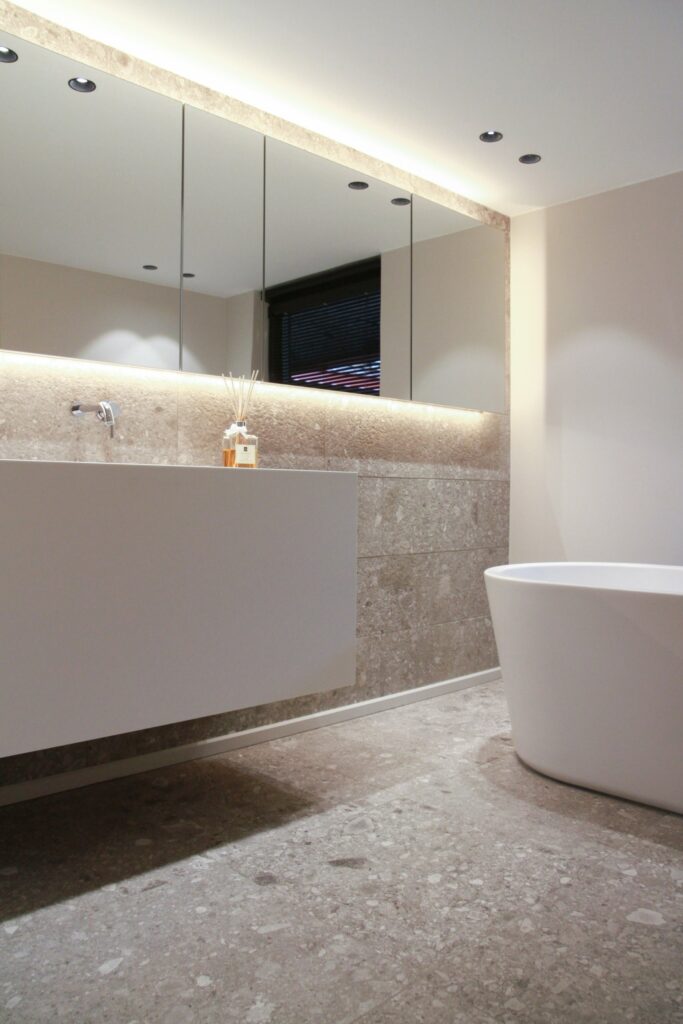
Key Takeaways
- Moisture resistance and safety should be your primary concerns when selecting bathroom stone flooring, with granite and quartzite leading the pack for durability in wet conditions.
- Professional installation and regular sealing are non-negotiable for the long-term performance and protection of your investment.
- The most cost-effective choice isn’t necessarily the cheapest stone upfront but rather the one that balances your budget with maintenance requirements and longevity – often making slate and granite top contenders.
The Most Common Bathroom Environment Challenges
Unlike other areas of your home, your bathroom floor faces constant exposure to water, humidity, and temperature changes. We’ve found that these conditions can significantly impact different stones in various ways.
The most critical challenges include:
- Constant moisture exposure: From shower steam to splashes, your floor rarely stays completely dry
- Temperature fluctuations: Hot showers can create significant temperature and humidity changes, causing some stones to expand and contract
- Chemical exposure: Regular contact with cleaning products, cosmetics, and toiletries can affect the stone’s surface
- Heavy foot traffic: Especially in main bathrooms, where the floor faces daily wear
- Safety requirements: Slip resistance becomes crucial in wet conditions, particularly in homes with children or elderly residents
Knowing about these challenges helps you narrow down your options to stones that can handle these demanding conditions while maintaining their beauty. In our experience, failing to account for even one of these factors can lead to costly repairs or premature replacement.
Popular Natural Stone Options
After years of installing and maintaining stone bathroom floors, we’ve developed clear favourites that stand the test of time.
Here are the natural stone options that we consistently recommend to our clients based on real-world performance and longevity.
Granite
Granite remains one of the most reliable choices for bathroom flooring, and for good reason. Its exceptional durability and low porosity make it naturally resistant to moisture, staining, and everyday wear. You’ll find granite available in countless colours and patterns, from subtle whites and greys to dramatic blacks with striking mineral veining.
Granite’s performance consistently impresses clients all over the world. The key lies in its crystalline structure, which creates a dense, nearly impervious surface when properly sealed.
Key benefits of granite include:
- Extremely durable and scratch-resistant, perfect for high-traffic bathrooms
- Low maintenance requirements compared to other natural stones
- Excellent water resistance when properly sealed
- Wide variety of colour options to match any design scheme
- High resistance to chemicals and cleaning products
- Superior resistance to etching from acidic substances
- Natural cooling properties, making it comfortable underfoot
- Excellent resale value and longevity
Slate
Slate is a proven choice in countless bathrooms. Its natural cleft surface provides built-in slip resistance, making it particularly suitable for bathroom environments. Modern slate options come in various finishes and colours, from traditional grey to warm earth tones.
What makes slate particularly special is its unique layered structure, which creates natural variations in texture and colour. This not only provides practical benefits but also ensures that no two slate floors are exactly alike.
Key advantages of slate include:
- A natural non-slip surface that improves safety in wet conditions
- Excellent water resistance due to its dense structure
- A unique, natural texture that adds character to any bathroom
- Durable and long-lasting when properly maintained
- Generally lower maintenance requirements than other stones
- Available in various thickness options for different applications
- Excellent heat retention properties
- Natural variations that create unique patterns
Quartzite
Don’t confuse natural quartzite with manufactured quartz – they’re entirely different materials. Natural quartzite offers exceptional hardness and durability, often surpassing even granite in these aspects. We’ve seen a growing trend towards quartzite in luxury bathrooms, thanks to its marble-like appearance combined with superior durability.
The formation process of quartzite, which involves intense heat and pressure, creates a stone that’s incredibly resistant to both physical and chemical damage. This makes it particularly well-suited for bathroom environments where both types of stress are common.
Notable features of quartzite include:
- Extremely hard and durable, often exceeding granite’s strength
- Highly resistant to etching from acidic substances
- Beautiful, marble-like aesthetics without marble’s maintenance concerns
- Excellent resistance to humidity and temperature changes
- Low maintenance requirements for a high-end stone
- Available in stunning patterns that mimic luxury marble
- Superior scratch resistance for long-term beauty
- Outstanding performance in wet environments
Alternative Options
While granite, slate, and quartzite are our top recommendations for bathroom floors, other options deserve consideration. Each alternative stone offers unique benefits and challenges that might make it perfect for your specific situation.
Marble
Marble is perhaps the best stone for bathroom floor when it comes to beauty and elegance, but it requires careful consideration for long-term use. While the results can be stunning, clients must understand the maintenance commitment.
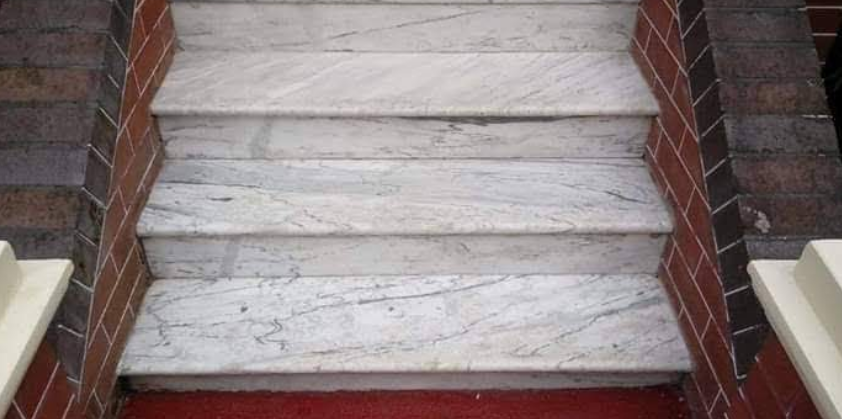
Key considerations for marble:
- Requires more frequent sealing than other stones
- Susceptible to etching from acidic substances
- Needs careful cleaning product selection
- Regular professional maintenance is recommended
- Available in countless unique patterns
- Adds significant property value when properly maintained
Travertine
Natural travertine creates a warm, welcoming atmosphere that many homeowners love. However, its unique formation process leaves natural holes that require special attention in bathroom settings.
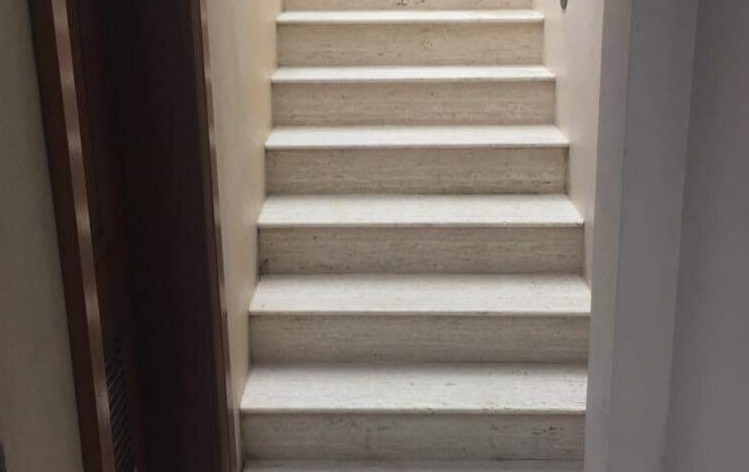
Important aspects of travertine:
- Natural holes need proper filling for bathroom use
- Warm, earthy colour palette
- More porous than other options
- Requires regular maintenance and sealing
- Creates a distinctive, classic look
- Available in various finishes and fills
Key Selection Criteria
When helping clients choose their bathroom stone, we consider several crucial factors. The perfect stone for your bathroom exists at the intersection of these key considerations:
| Budget Considerations | Practical Factors | Maintenance Commitment |
|---|---|---|
| Initial material costs and availability | Room size and layout considerations | Daily cleaning requirements |
| Installation requirements and complexity | Natural light exposure and its effects | Sealing frequency and complexity |
| Long-term maintenance expenses | Traffic patterns and usage intensity | Professional maintenance needs |
| Expected lifespan of the installation | Existing décor compatibility | Time available for upkeep |
| Potential repair needs and costs | Ventilation quality and moisture control | Local professional service availability |
| Property value impact | Underfloor heating compatibility | Long-term care considerations |
Important Technical Considerations
Based on our extensive experience, these technical aspects require careful attention before making your final decision:
Porosity and Sealing
Every natural stone has different porosity levels that affect its performance in bathroom settings:
- Initial sealing requirements and processes
- Resealing frequency based on stone type
- Sealer-type compatibility for wet areas
- Moisture absorption rates and implications
- Surface texture impact on sealing
- Edge sealing requirements
Installation Specifications
Professional installation is crucial for bathroom stone flooring:
- Proper substrate preparation methods
- Comprehensive waterproofing requirements
- Appropriate setting materials selection
- Expansion joint placement and necessity
- Proper drainage slopes and considerations
- Transition strip requirements
Safety Standards
Bathroom safety should never be compromised:
- Slip resistance ratings for wet conditions
- Surface texture options and implications
- Edge treatment choices for safety
- Grout line width requirements
- Transition point considerations
- ADA compliance where needed
Conclusion
Ready to transform your bathroom with the perfect natural stone floor? At StoneProtection, we’ve been helping Australian homeowners make informed decisions about natural stone for over two decades.
Contact us today for a free consultation and let our experts guide you through the selection process – we’ll ensure you choose the perfect stone that combines beauty, durability, and practicality for your unique space.
Frequently Asked Questions About Natural Stone Bathroom Floors
How long does natural stone flooring last in bathrooms?
With proper installation and maintenance, natural stone bathroom floors can last for generations. We’ve seen properly maintained floors looking beautiful after 30+ years. The key is choosing the right stone for your specific situation and maintaining it correctly.
What’s the most durable stone for a family bathroom?
Based on our experience, granite and quartzite are the most durable options for busy family bathrooms. They resist scratches, stains, and moisture exceptionally well, and they require less maintenance than softer stones like marble or limestone.
Do I really need professional installation?
Absolutely. Proper installation is crucial for bathroom stone flooring. We’ve seen many cases where DIY installations led to moisture problems, uneven wear, and even structural issues. Professional installation ensures proper waterproofing, substrate preparation, and sealing.
How often should I seal my stone bathroom floor?
It depends on the stone type and usage:
- Granite: Every 12-18 months
- Slate: Every 12 months
- Quartzite: Every 12-18 months
- Marble: Every 6-12 months
- Travertine: Every 6-12 months
Can I use regular cleaning products on my stone floor?
No! This is one of the most common mistakes we see. Only use pH-neutral cleaners specifically designed for natural stone. Regular household cleaners can damage the stone’s surface and strip the sealer, leading to costly repairs.
What’s the best stone for underfloor heating?
Dense stones like granite and slate conduct heat efficiently and work well with underfloor heating systems. We’ve found that these materials provide excellent heat distribution while maintaining their structural integrity.
How do I prevent slipping on stone bathroom floors?
Several options exist:
- Choose naturally textured stones like slate
- Opt for honed or brushed finishes instead of polished
- Use anti-slip treatments on existing floors
- Install smaller tiles for more grout lines and better grip
What’s the most cost-effective natural stone for bathrooms?
While initial costs vary by region, we’ve found that slate often provides the best value for money when considering durability, maintenance requirements, and longevity. However, even premium stones like granite can be cost-effective in the long run due to their exceptional durability.
Can natural stone lose its shine in bathrooms?
Yes, but it’s preventable. Loss of shine usually occurs from:
- Using incorrect cleaning products
- Lack of proper sealing
- Physical wear in high-traffic areas
- Hard water deposits Regular maintenance and professional restoration when needed will keep your stone looking beautiful.

